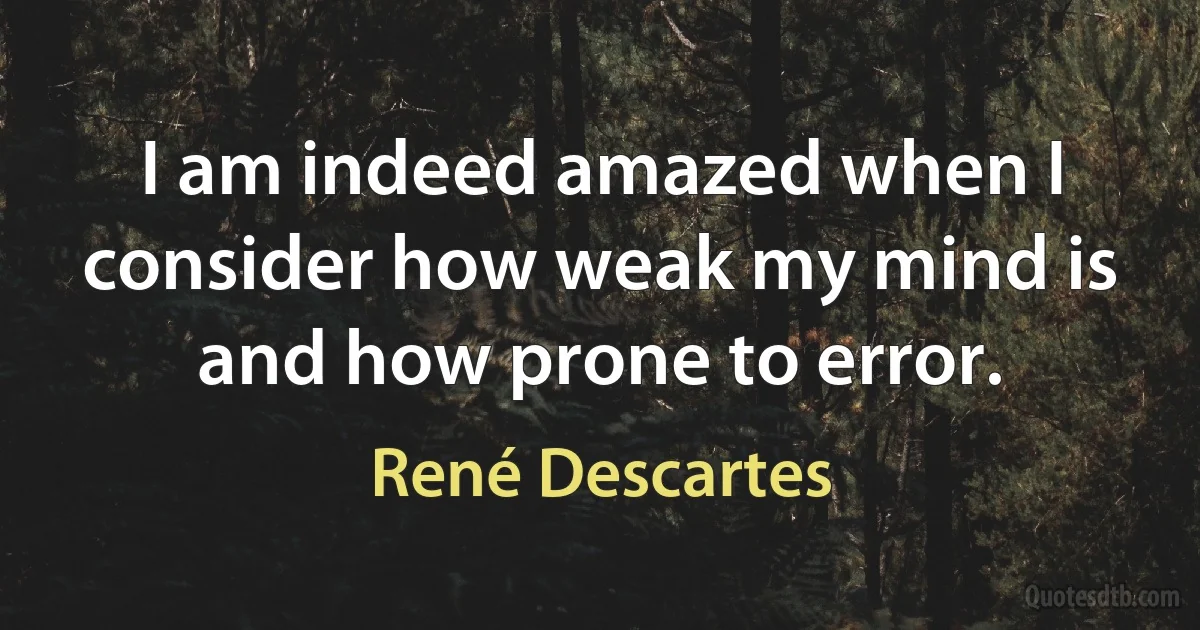Error Quotes - page 21
Doing what is for the good of the people, this must be the truest criterion of right government, in accordance with which the wise and good man will govern the affairs of his subjects. Just as the captain of a ship keeps watch for what is at any moment for the good of the vessel and the sailors, not by writing rules, but by making his science his law, and thus preserves his fellow voyagers, so may not a right government be established in the same way by men who could rule by this principle, making science more powerful than the laws? And whatever the wise rulers do, they can commit no error, so long as they maintain one great principle and by always dispensing absolute justice to them with wisdom and science are able to preserve the citizens and make them better than they were, so far as that is possible.

Plato
It may be safely assumed as an axiom in the government of states that the greatest wrongs inflicted upon a people are caused by unjust and arbitrary legislation, or by the unrelenting decrees of despotic rulers, and that the timely revocation of injurious and oppressive measures is the greatest good that can be conferred upon a nation. The legislator or ruler who has the wisdom and magnanimity to retrace his steps when convinced of error will sooner or later be rewarded with the respect and gratitude of an intelligent and patriotic people.
Our own history, although embracing a period less than a century, affords abundant proof that most, if not all, of our domestic troubles are directly traceable to violations of the organic law and excessive legislation.

Andrew Johnson
Coleridge observes that all men are born Aristotelians or Platonists. The latter feel that classes, orders, and genres are realities; the former, that they are generalizations. For the latter, language is nothing but an approximative set of symbols; for the former, it is the map of the universe. The Platonist knows that the universe is somehow a cosmos, an order; that order, for the Aristotelian, can be an error or a fiction of our partial knowledge. Across the latitudes and the epochs, the two immortal antagonists change their name and language: one is Parmenides, Plato, Spinoza, Kant, Francis Bradley; the other, Heraclitus, Aristotle, Locke, Hume, William James.

Jorge Luis Borges
I went to the artisans, for I was conscious that I knew nothing at all, as I may say, and I was sure that they knew many fine things of which I was ignorant, and in this they certainly were wiser than I was. But I observed that even the good artisans fell into the same error as the poets; because they were good workmen they thought they knew all sorts of high matters, and this defect in them overshadowed their wisdom - therefore I asked myself on behalf of the oracle, whether I would like to be as I was, neither having their knowledge nor their ignorance, or like them in both; and I made answer to myself and the oracle that I was better off as I was.

Socrates
He shows Himself to the soul in the living mirror of her intelligence;
Not as He is in His nature,
But in images and similitudes,
And in the degree in which the illuminated reason can grasp and understand Him.
And the wise reason, enlightened of God, sees clearly
And without error in images of the understanding
All that she has heard of God,
Of faith, of truth, according to her longing.
But that image which is God Himself,
Although it is held before her, she cannot comprehend;
For the eyes of her understanding
Must fail before that Incomparable Light.

John Ruysbroeck
He [the devil] always sends errors into the world in pairs-pairs of opposites. And he always encourages us to spend a lot of time thinking which is the worse. You see why, of course? He relies on your extra dislike of the one error to draw you gradually into the opposite one. But do not let us be fooled. We have to keep our eyes on the goal and go straight through between both errors. We have no other concern than that with either of them.

C. S. Lewis
When you are famous it is hard to work on small problems. [...] The great scientists often make this error. They fail to continue to plant the little acorns from which the mighty oak trees grow. They try to get the big thing right off. And that isn't the way things go. So that is another reason why you find that when you get early recognition it seems to sterilize you. [...] The Institute for Advanced Study in Princeton, in my opinion, has ruined more good scientists than any institution has created, judged by what they did before they came and judged by what they did after.

Richard Hamming
The use of the intellect in the sciences whose primitive concepts as well as axioms are given by sensuous intuition is only logical, that is, by it we only subordinate cognitions to one another according to their relative universality conformably to the principle of contradiction, phenomena to more general phenomena, and consequences of pure intuition to intuitive axioms. But in pure philosophy, such as metaphysics, in which the use of the intellect in respect to principles is real, that is to say, where the primary concept of things and relations and the very axioms are given originally by the pure intellect itself, and not being intuitions do not enjoy immunity from error, the method precedes the whole science, and whatever is attempted before its precepts are thoroughly discussed and firmly established is looked upon as rashly conceived and to be rejected among vain instances of mental playfulness.

Immanuel Kant
The studious and good and true, never suffer their minds to be warped by the passions of hatred and envy, which unfit men duly to weigh the arguments that are advanced in behalf of truth, or to appreciate the proposition that is even fairly demonstrated. Neither do they think it unworthy of them to change their opinion if truth and undoubted demonstration require them to do so. They do not esteem it discreditable to desert error, though sanctioned by the highest antiquity, for they know full well that to err, to be deceived, is human; that many things are discovered by accident and that many may be learned indifferently from any quarter, by an old man from a youth, by a person of understanding from one of inferior capacity.

William Harvey
Rationalism in politics, as I have interpreted it, involves an identifiable error, a misconception with regard to the nature of human knowledge, which amounts to a corruption of the mind. And consequently it is without the power to correct its own short-comings; it has no homeopathic quality; you cannot escape its errors by becoming more sincerely or more profoundly rationalistic.

Michael Oakeshott
Early scientific thinking was holistic, but speculative -- the modern scientific temper reacted by being empirical, but atomistic. Neither is free from error, the former because it replaces factual inquiry with faith and insight, and the latter because it sacrifices coherence at the altar of facticity. We witness today another shift in ways of thinking: the shift toward rigorous but holistic theories. This means thinking in terms of facts and events in the context of wholes, forming integrated sets with their own properties and relationships.

Ervin László
![It seems to me that today the Surrealist crisis is the central problem in French art. It is essential for future development that this crisis should be solved... The principal error in the aesthetic program of Surrealism is that it is too literary. Painters have experimented with visions, images, dreams, but not with painting, not with color.. .The unpainterliness of Surrealism has inevitably produced a reaction among younger painters. [Jorn is thinking here of French painters such as Bazaine, Esteve, Lapique, Singier, Le Moal, and he suggests there should be reciprocity].. .These artists cannot get any further unless they absorb the lessons of Surrealism into their painting, just as Surrealists can only advance if they adopt the painterly methods of the other group. (Asger Jorn)](https://cdn.quotesdtb.com/img/quotes_images_webp/63/asger-jorn-advance-aesthetic-426463.webp)


